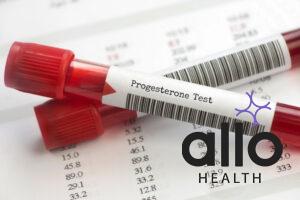Can We Do Blood Tests During Periods?

Allo Health is dedicated to personalized well-being, offering support and trusted information tailored to individual health goals. The platform emphasizes human-generated content, led by a distinguished medical team of experts, including physicians and sexual health specialists. Their commitment to credibility involves rigorous fact-checking, authoritative research, and continuous updates to ensure accurate, up-to-date information. Allo Health's unique approach goes beyond conventional platforms, providing expert-led insights and a continuous commitment to excellence, with user feedback playing a crucial role in shaping the platform's authoritative voice.

Dr. Aswathi P T earned her MBBS degree and completed her internship at Government Medical College, Kozhikode, and possess diverse professional background spanning 3.5 years. Her experience includes a wide range of healthcare settings, including health centers, hospitals, and teleconsultation services.
Why This Was Upated?
Our experts continually monitor the health and wellness space, and we update our articles when new information became available.
Updated on 09 April, 2024
- Article was updated as part of our commitment to diversity, equity, and inclusion.
"The following blog article provides general information and insights on various topics. However, it is important to note that the information presented is not intended as professional advice in any specific field or area. The content of this blog is for general educational and informational purposes only.
Book consultation
The content should not be interpreted as endorsement, recommendation, or guarantee of any product, service, or information mentioned. Readers are solely responsible for the decisions and actions they take based on the information provided in this blog. It is essential to exercise individual judgment, critical thinking, and personal responsibility when applying or implementing any information or suggestions discussed in the blog."
Blood tests are an important part of healthcare, providing doctors with detailed information about a patient’s health. However, for many women, the question of whether it is safe to do blood tests during periods remains a concern. In this article, we will explore the effects of menstruation on blood test results, the types of tests that can be done during periods, and how to schedule your blood tests around your menstrual cycle.
Why Regular Blood Testing Is Important for Women?

Blood testing plays a crucial role in monitoring and maintaining women’s health. Regular blood glucose levels offer valuable insights into overall well-being, from assessing blood glucose levels to tracking hormonal changes. The benefits of blood testing are:
Hormonal Balance and Menstrual Health:
Regular blood tests help monitor hormonal fluctuations throughout a woman’s menstrual cycle. Testing during the luteal phase can reveal essential insights into forms of estrogen and progesterone, aiding in identifying hormonal imbalances that might contribute to menstrual irregularities, mood swings, and other related concerns.
Cardiovascular Health:
Blood testing provides valuable information about cholesterol levels, triglycerides, and other lipids in the bloodstream. Elevated cholesterol levels can indicate an increased risk of heart disease and blood clots. Regular blood investigations enable early detection and intervention.
Diabetes Management and Blood Glucose Levels:
Regular blood sugar level monitoring is essential for women at risk of or diagnosed with diabetes. Blood tests reveal how effectively the body processes sugar, enabling early detection and effective management of diabetes.
Disease Prevention and Early Detection:
Routine blood tests can identify potential health issues before they become symptomatic. Abnormal blood report analysis might indicate thyroid dysfunction, anemia, or other underlying conditions.
Blood Pressure and Hypertension:
Blood tests help monitor blood pressure levels and assess cardiovascular health. High blood pressure is a significant risk factor for heart disease, stroke, and other complications.
How Menstruation Affects Blood Test Results

The menstrual cycle involves complex hormonal fluctuations. Initially, the hypothalamus releases GnRH, stimulating the pituitary gland to produce FSH (follicle stimulating hormone) and LH (luteinizing hormone). FSH triggers egg maturation, while LH prompts ovulation.
After ovulation, LH stimulates the corpus luteum to release progesterone, preparing the uterus for potential pregnancy. If fertilization doesn’t occur, progesterone levels drop, leading to menstruation. These hormonal shifts orchestrate the menstrual cycle’s phases, influencing reproductive processes. Menstruation affects blood test results in the following ways:
Impact on Hormone Levels:
During menstruation, hormonal shifts, including estrogen and progesterone, can influence blood test outcomes. These fluctuations may affect enzyme production and metabolism, impacting test accuracy.
Various hormones like cortisol, follicle-stimulating hormone, and luteinizing hormone can also experience changes during the menstrual cycle, affecting test readings.
Blood Volume and Electrolyte Measurements:
Menstrual changes in blood volume can influence kidney function tests and electrolyte measurements (e.g., sodium, potassium). Blood volume alterations may impact these tests, leading to potential misinterpretation of results.
Timing and Cycle Phases:
Blood test timing in relation to the menstrual cycle matters. Certain phases may yield more accurate results for specific tests. Adjustments might be necessary to accommodate cycle variations and enhance result reliability.
Heavy Bleeding’s Impact:
Increased bleeding during menstruation can further affect blood volume and potentially skew test outcomes. Understanding the potential influence of heavier bleeding is crucial for accurate interpretation.
Menstrual Cycle and Hormonal Birth Control:
Hormonal birth control pills alter estrogen and progesterone levels, potentially affecting readings for hormonal blood tests, including thyroid blood tests, cholesterol, and cortisol levels.
Some studies suggest hormonal birth control pills might raise liver enzyme levels, affecting liver function test results and indicating liver damage or disease.
Certain birth control pills can influence clotting factors like prothrombin time (PT) and activated partial thromboplastin time (aPTT), affecting coagulation test results.
Precision Matters:
Certain blood tests, such as iron levels, can be impacted by menstrual bleeding, decreasing temporary iron levels. For precise results, scheduling iron tests outside of the menstrual period is advisable.
If timing adjustments aren’t feasible, informing your healthcare provider about your cycle and test timing is essential to maintain result accuracy.
Hormonal Fluctuations and Blood Biomarkers
The menstrual cycle’s hormonal changes influence blood biomarkers, with estrogen and progesterone shifts impacting various physiological processes.
Impact on Glucose Levels:
Hormonal fluctuations during the menstrual cycle can affect insulin sensitivity and glucose regulation, potentially leading to subtle changes in blood glucose levels.
Lipid Profiles and Hormonal Changes:
Estrogen variations may influence lipid metabolism, possibly enhancing HDL (high-density lipids) and suppressing LDL (low-density lipids) cholesterol oxidation, impacting lipid profiles.
Inflammation and Immune Markers:
Hormonal shifts can modulate inflammation and immune markers like C-reactive protein (CRP), potentially causing variations across menstrual phases.
Interpreting Blood Biomarkers:
Understanding menstrual cycle effects is crucial for interpreting blood biomarkers accurately, necessitating phase-specific reference ranges for certain markers.
Impact on Iron levels:
The iron group blood biomarkers are slightly low during periods and results in low levels during blood test.
Can We Do Blood Test During Periods?

Yes, blood tests can be done during periods, but there are factors to consider. Menstruation can potentially impact certain blood test results due to hormonal changes and changes in blood volume. However, in many cases, blood tests can still be conducted with proper considerations and adjustments.
Factors to Consider When Doing Blood Tests During Periods
- Hormonal Fluctuations: Hormonal changes during menstruation, such as shifts in estrogen and progesterone levels, can influence the liver’s enzyme production, affecting drug metabolism and certain test results.
- Impact on Hormone Levels: Menstrual cycles can alter the levels of hormones like cortisol, thyroid-stimulating hormone, follicle-stimulating hormone, and luteinizing hormone, potentially affecting the interpretation of test results.
Blood Tests That May Be Affected During Periods
- Drug Metabolism Tests: During menstruation, hormonal changes can impact liver enzyme production, which may influence drug metabolism tests’ accuracy.
- Hormone Level Tests: Hormonal fluctuations can affect the levels of various hormones, leading to potentially misleading results in hormone level tests.
Tips for Accurate Blood Tests During Periods
- Inform Your Healthcare Provider: Always inform your healthcare provider about your menstrual cycle and any hormonal birth control methods you use when discussing or interpreting blood test results.
- Consider Timing: Certain tests may be more accurate if scheduled during specific menstrual cycle phases, ensuring reliable results.
When to Reschedule Blood Tests
- Heavy Menstrual Flow: If you experience heavy bleeding during your period, it might be advisable to reschedule blood tests to avoid potential alterations in blood volume affecting results.
- Iron Deficiency Testing: For iron deficiency tests, it’s preferable to schedule the test outside of the menstrual period to avoid skewed results due to temporary iron loss.
Consult Your Healthcare Provider
While blood tests during periods are generally possible, it’s recommended to consult your healthcare provider. They can offer guidance on the best timing for specific tests and ensure accurate and reliable results, taking your menstrual cycle into account.
Blood Tests During Menstruation: Uninterrupted
- Blood Glucose Tests: Blood glucose levels can be accurately measured during menstruation, providing insights into diabetes management.
- Complete Blood Count (CBC) Tests: CBC tests, which assess various blood components like red and white blood cells, can be conducted without interference from menstruation.
- Liver Function Tests: Evaluating liver health through tests like ALT and AST can proceed during menstruation, as hormonal changes have minimal impact.
- Hemoglobin, Hematocrit, and Red Blood Cell Counts: These measures of blood health remain stable during menstruation, allowing for accurate assessment.
Tips for Accurate Blood Test Results During Periods:
To secure precision in results, consider avoiding blood tests during menstruation. Schedule tests for consistent and accurate readings from days 5 to 28 of your menstrual cycle.
The initial five days may reveal lower hemoglobin levels, while hormonal shifts during the last days might lead to irregular outcomes. By selecting days 5 to 28, you minimize these potential discrepancies. The following tips can be useful for accurate blood test results
- Avoid Alcohol, Caffeine, and Smoking: Refrain from consuming alcohol, caffeine, and tobacco 24 hours before the blood test to prevent potential interference with accurate results.
- Mind Your Diet: Reduce consumption of sugary and fatty foods leading up to the test, as these can impact blood biomarkers.
- Stay Hydrated: Drink adequate water before the test to ensure proper blood draw and minimize the impact of dehydration on test readings.
Conclusion
While some precautions apply to blood tests during periods, many tests can proceed safely. Share your cycle and birth control use with your healthcare provider for precise results. Alternative diagnostics and innovations, like menstrual cups that track health, empower women to manage their well-being.
Menstrual cups with sensors are a breakthrough, detecting changes in flow and health. Wearable devices also emerge, monitoring temperature and more for non-invasive insights into menstrual health and overall wellness.
Frequently Asked Questions
Q. Can heavy bleeding during periods affect blood test results?
A. Yes, heavy bleeding can lead to menstrual blood loss and anemia, potentially impacting results of tests for iron deficiency.
Q. Should I inform my healthcare provider about my menstrual cycle before a blood test?
A. Yes, informing your healthcare provider about your menstrual cycle and any hormonal birth control usage is important for accurate interpretation of blood test results.
Q. Does menstruation affect blood test accuracy?
A. Menstruation can impact certain blood levels due to hormonal fluctuations, potentially affecting results like thyroid function, cholesterol levels, and electrolytes.
Q. How can I ensure accurate blood test results during periods?
A. To ensure accuracy, avoid alcohol, caffeine, and smoking before the test, stay well-hydrated, and consider scheduling tests between days 5 and 28 of your menstrual cycle.
Q. What is maternal screening test?
A. Maternal blood screening test, also known as prenatal blood screening, is a diagnostic procedure conducted during pregnancy to assess the risk of certain genetic conditions and birth defects in the developing fetus. This non-invasive test involves analyzing a sample of the pregnant woman’s blood to detect markers and substances that may indicate the presence of specific conditions.






































